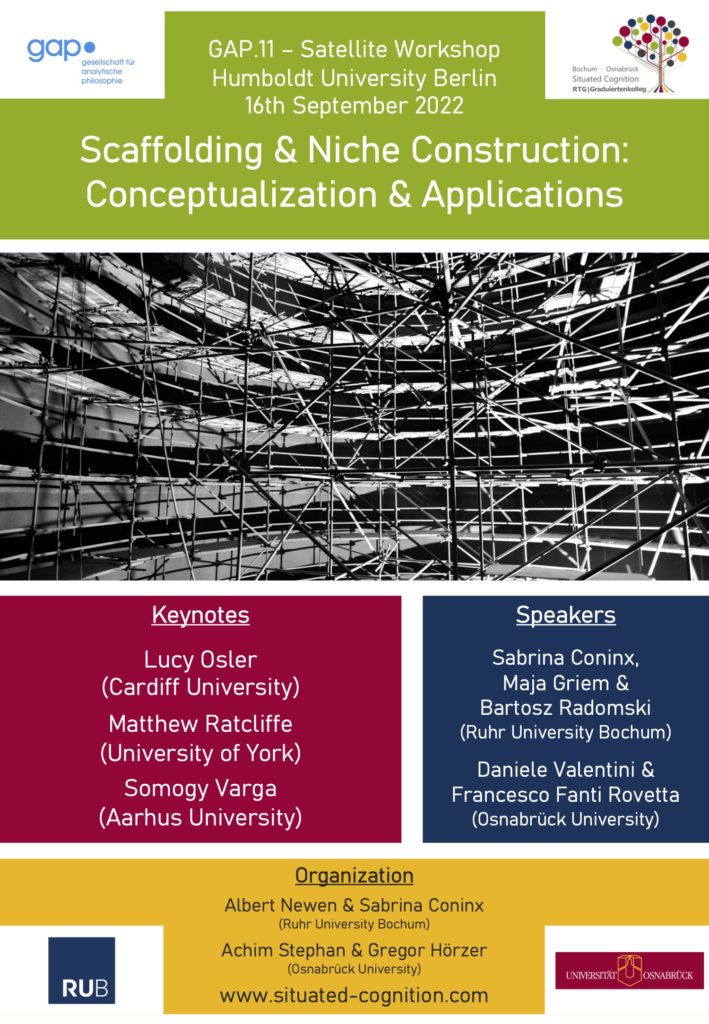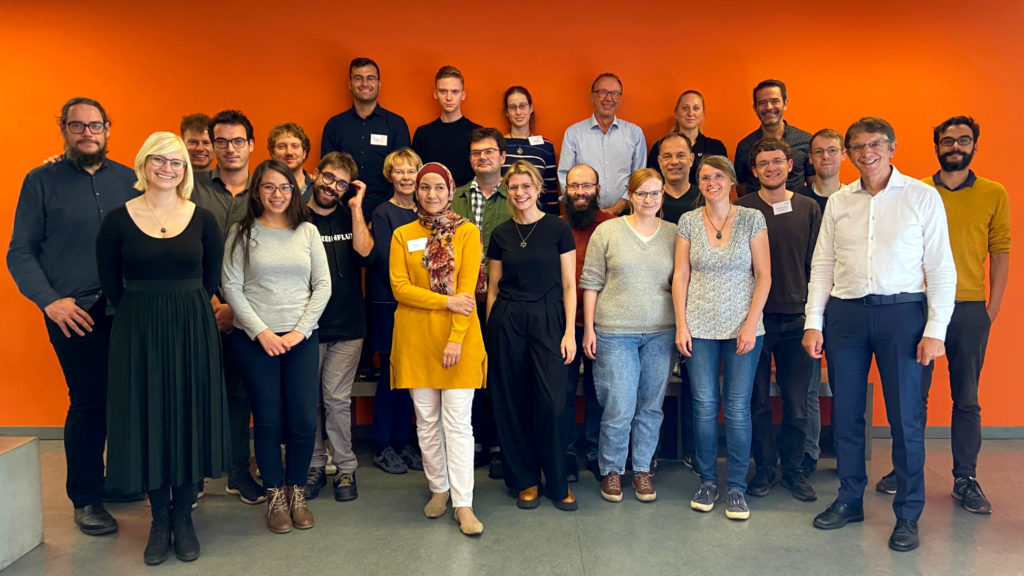

GAP.11 – Satellite Workshop
“Scaffolding & Niche Construction: Conceptualization & Applications”
Organization:
Prof. Albert Newen, Prof. Achim Stephan,
Dr. Sabrina Coninx, & Dr. Gregor Hörzer
Date:
16th September 2022
Venue:
Humboldt-Universität, Seminargebäude am Hegelplatz (DOR 24, 1.308), Dorotheenstr. 24, Berlin
Reminder:
Do not forget to register for the GAP.11 conference to receive eligible access to our satellite workshop. You can register here: www.conftool.pro/gap11/
| TIME | TYPE | TITLE | TOPIC |
|---|---|---|---|
08:30 – 09:00 | Arrival | ||
09:00 – 09:15 | Introduction | ||
09:15 – 10:15 | Keynote | Prof. Somogy Varga (Aarhus University) Scaffolding: Types and Applications | (1) Conceptual Issues |
10:15 – 11:00 | Internal | Dr. Sabrina Coninx (Ruhr University Bochum) The Dark Side of Niche Construction | (1) Conceptual Issues |
11:00 – 11:30 | Snack Break | ||
11:30 – 12:15 | Internal | Bartosz Radomski (Ruhr University Bochum) Adaptivity as a Philosophical Problem from the Enactive and Free-Energy Perspectives | (2) Biological & Cultural Evolution |
12:15 – 13:00 | Internal | Maja Griem (Ruhr University Bochum) Playful Scaffolding in Non-Human Animals: How Social Signals Shape Learning Environments | (2) Biological & Cultural Evolution |
13:00 – 14:15 | Lunch Break | ||
14:15 – 15:15 | Keynote | Dr. Lucy Osler (Cardiff University) The Quantified Self: Scaffolded Self-Understanding and Narrative Straight Jackets | (3) Socio-Political & Socio-Technological Developments |
15:15 – 16:00 | Internal | Daniele Valentini (Osnabrück University) Platform-Based Extremism: Affectivity Online and New Media Embodied Practices | (3) Socio-Political & Socio-Technological Developments |
16:00 – 16:45 | Coffee Break | ||
16:45 – 17:30 | Internal | Francesco Fanti Rovetta (Osnabrück University) Inner Speech Scaffolding the Dialogical Self and When It Goes Bad: The Case of Verbal Rumination | (4) Perspectives on the Individual |
17:30 – 18:30 | Keynote | Prof. Matthew Ratcliffe (University of York) Emotional Scaffolding: The Case of Grief | (4) Perspectives on the Individual |
Abstract:
In the growing literature of situated philosophical theories, two concepts have proven central in the attempt to characterize the influence of extra-bodily factors on cognitive and affective phenomena: scaffolding and niche construction. Both concepts seem to characterize closely related processes of using, structuring, or changing aspects of the environment, intentionally or unintentionally, in such a way that the environment fulfills a certain enabling, supporting, enhancing, or regulating function for the activities, skills, and capacities of agents. Moreover, both concepts seem to focus on ways of establishing certain relations between (dispositional and non-dispositional) properties of an organism and the environment. Further, both concepts have been applied to a heterogeneous class of extra-bodily objects, such as food, art, technical devices, and other people, and a variety of areas in the cognitive sciences, such as memory, social understanding, perceptual judgment, and emotion regulation.
Read more…
While the discourse around these concepts is proving fruitful, some key aspects remain so far under-developed. First, although scaffolding and niche construction are widely discussed, there is still no agreement on their conceptualization, that is, how these concepts are best understood, which phenomena they are best thought to apply to, and what ontological status should be attributed to them. Further, it might be asked how the concepts of scaffolding and niche construction themselves relate to each other as well as to other central concepts in the debate on situated cognition and affectivity. Are there clear cases where only one of the two concepts of scaffolding and niche construction is applicable? Or can both concepts be applied to each case? Could it even be that “scaffolding” and “niche construction” are just two names for the same phenomenon? How do the two concepts relate to the notions of embeddedness and extendedness? And, what might make them more fruitful? Second, the concepts of scaffolding and niche construction originate in the field of biological and cultural evolution. Increasingly, they are also applied to life in modern societies, including socio-political and socio-technological phenomena, as well as personal aspects, including an individual’s ontogentic development as well as their situational interaction and coordination with the environment. What makes scaffolding and niche construction apt for such diverse fields of application? Does it make sense to apply the original concepts of scaffolding and niche construction in this manner, and does this require to adapt the original notions? Do they thereby gain in significance or ultimately become so broad that they can be trivially applied to anything whatsoever? Third, most of the early research on the processes of scaffolding and niche construction has highlighted the positive aspects of these processes for a person’s activities, skills, and capacities. However, recent research has started to shed light on fields of application in which potentially negative aspects take center stage. For example, these concepts have found application in the field of religious and political radicalization or the development of psychopathologies. What can we learn from focusing more strongly on these fields of application? Do we thereby really study the negative side of scaffolding and niche construction, or should we better think of this research as focusing on different phenomena that are to be distinguished from scaffolding and niche construction?
The aim of the workshop is to discuss the previously indicated questions to lay the groundwork towards a more fine-grained conceptual framework for scaffolding and niche construction and to advance our understanding of these phenomena by integrating the results of different philosophical debates and their related fields of application. The workshop will consist of four thematic blocks. Block (1), Conceptual Issues, critically reflects general questions regarding the notions of scaffolding and niche construction and their range of application in the philosophical debate, while blocks (2) to (4) focus on different Applications of these two concepts structured along the spatio-temporal units of analysis they respectively concern. Block (2), Biological & Cultural Evolution, addresses the application to the historically far-reaching processes of the diachronic development of the human species in relation to its environment, including the interaction with material objects, other humans, as well as non-human organisms. Block (3), Socio-Political and Socio-Technological Developments, concerns sociogenetic processes in which the concepts of scaffolding and niche construction might be used to better understand group dynamics, developments in political climate, influences of increasing interaction with AIs, or changes in human communication through social media. Block (4), Perspectives on Individuals, assesses the role of scaffolding and niche construction in understanding the ontogenetic developments of individuals throughout childhood and adulthood and their dynamic coordination with the environment in particular situations. This includes, for example, the influence of different styles of narrative thinking on social interaction as well as of environmental factors on the generation and maintenance of psychopathologies and addictions.
We expect fruitful interaction between these different thematic units. As a subject area that crosses the conceptual issues as well as the different fields of application, we expect that both the bright and the dark side of scaffolding and niche construction will be addressed. For example, with respect to socio-technological developments, this includes the positive affective aspects of social online interaction in the pandemic as well as the emergence of echo chambers on social media platforms that (negatively) contribute to political and religious radicalization. Similarly, regarding a person’s individual perspective, worthwhile to take into account are both the ways in which the environment can enrich and enable an individual’s abilities, skills, and capacities and the systematic debilitating or restricting effects of certain environmental structures that may contribute to physiological and psychological health issues.
As speakers we are pleased to include three international guests who have made significant contributions to the philosophical debate on scaffolding and niche construction, as well as selected members of the Research Training Group who work on related topics to bring together the perspectives of established scientists with those of early career researchers to further the debate. There will be two speakers for each of the four thematic blocks. We are pleased to have gained the following three external speakers as keynotes for the satellite workshop: Prof. Somogy Varga, Dr. Lucy Osler, & Prof. Matthew Ratcliffe. From the RTG the following speakers will present their work: Dr. Sabrina Coninx, Maja Griem, Bartosz Radomski, Daniele Valentini, and Francesco Fanti Rovetta.

Additional Links:
We refer to the main page of the GAP.11 for further information: https://gap11.de
The detailed program of the entire conference can be found here, as well as all the other satellite workshops: https://gap11.de/programm.html#SNC
You can also find the detailed plan of the sections here: https://gap11.de/pdf/Sektionsplan_24.06.2022.pdf

Thanks to all of you for this great time at the GAP.11 in Berlin, 2022.